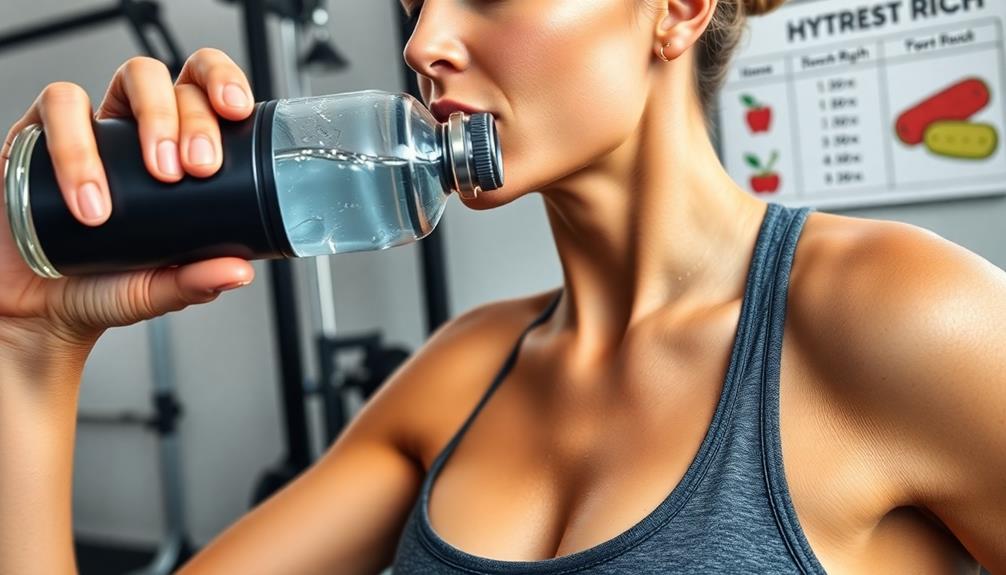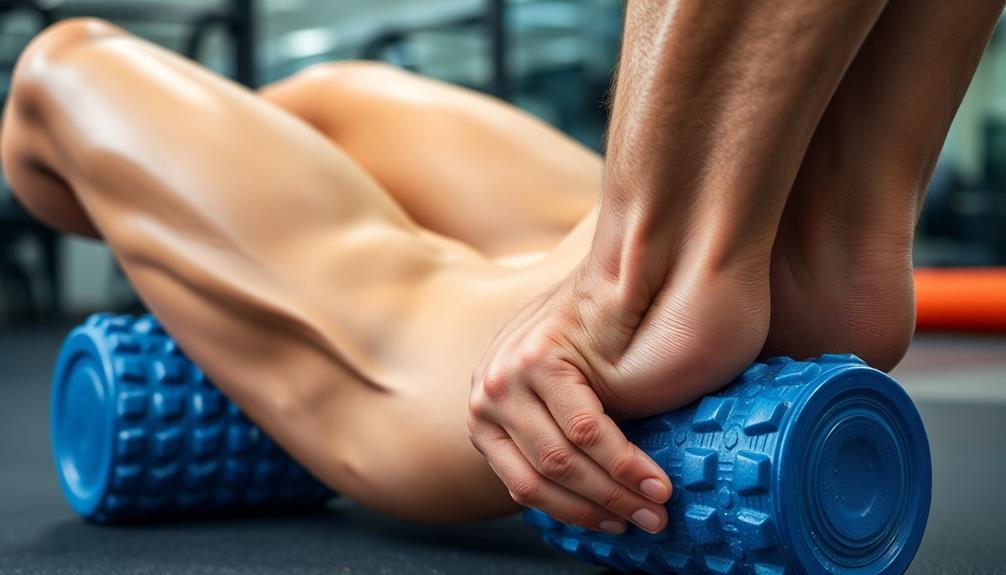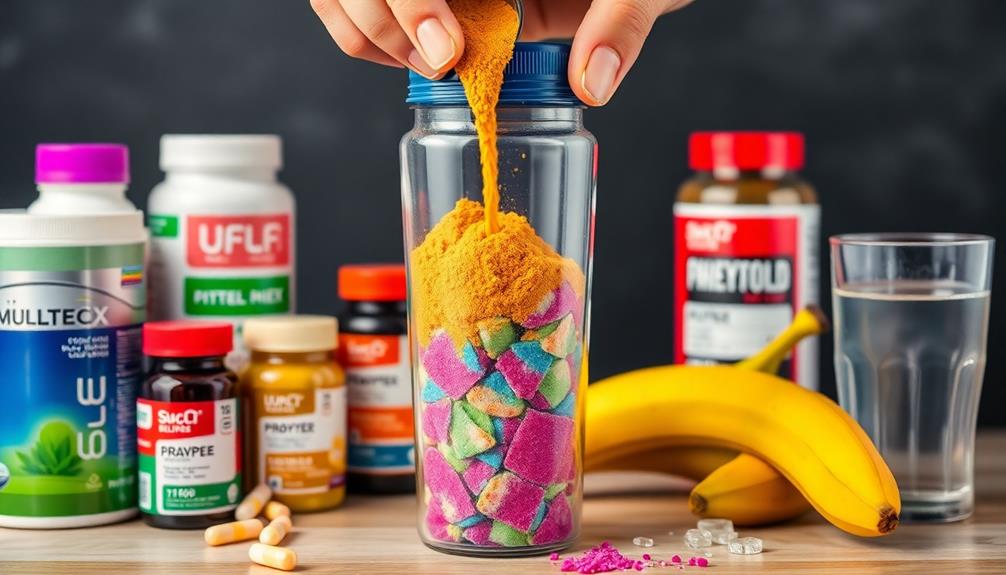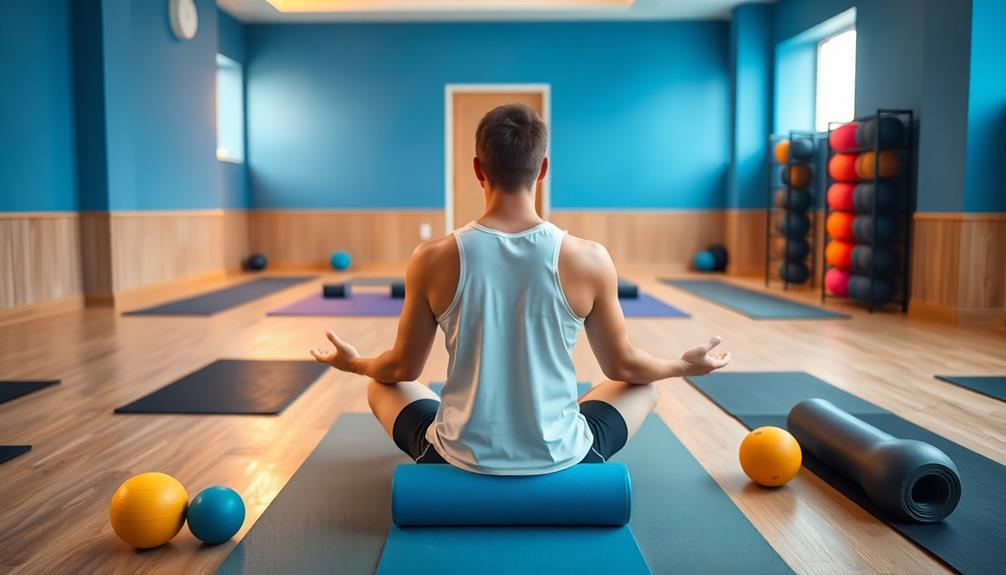To effectively repair your muscles, prioritize post-workout nutrition with protein and carbs, and stay consistently hydrated. Aim for 7-9 hours of quality sleep each night, and establish a relaxing bedtime routine. Incorporate stretching and cooling down practices after workouts, and use foam rolling techniques to target large muscle groups. Listen to your body's signals, recognizing signs of potential injury and the importance of rest. Include active recovery days in your routine, and consider wise supplementation. Manage stress levels to support overall recovery. By implementing these strategies, you'll optimize your muscle repair process and enhance your fitness journey.
Core Insight
- Prioritize post-workout nutrition with protein and carbohydrates to support muscle repair and replenish energy stores.
- Aim for 7-9 hours of quality sleep nightly to optimize muscle recovery and growth.
- Incorporate foam rolling and static stretching to reduce muscle soreness and improve flexibility.
- Stay hydrated with water, electrolyte-rich beverages, and hydrating foods to support muscle function and recovery.
- Listen to your body's signals and allow adequate rest between workouts to prevent overtraining and potential injuries.
Prioritize Post-Workout Nutrition

Eating after your workout is one of the most important steps for rebuilding muscle. Within 30 minutes of finishing exercise, eat a meal or drink a shake with protein and carbs. Try to get 20-30 grams of protein from high-quality sources. This gives your muscles the amino acids they need to recover.
Fast-absorbing carbs are great for quick energy and optimal recovery. They refill your glycogen stores and help your body use the protein better. Carb powders that dissolve easily and blend well with your shake are a convenient option.
Don't forget to drink enough water or a drink with electrolytes. This replaces the fluids you lost while working out. It also helps carry nutrients to your recovering muscles. Keep eating well-rounded meals during the day since muscle repair is a continuous process.
Focusing on nutrition after exercise gives your body what it needs to fix and build muscle effectively. Make this a key part of your workout routine for the best results.
Hydrate Consistently

Staying hydrated is key while your muscles heal. Water moves nutrients to your muscles and gets rid of waste. Drink water throughout the day, not only during exercise. Hydration powders with electrolytes and minerals can help muscles recover.
Try to drink 8-10 glasses of water each day. Drink more on days you work out. Carry a water bottle and drink often. Don't wait until you're thirsty – that means you're already dehydrated.
After tough workouts, drink fluids with electrolytes to replace lost minerals. Coconut water and sports drinks can help, but watch out for added sugar. You can also get fluids from foods like cucumbers, watermelon, and soups. Staying hydrated helps muscles recover and improves performance.
Get Adequate Sleep

Sleep is key for muscle repair and recovery. During deep sleep, your body releases growth hormone, which helps your muscles heal and grow. If you have trouble sleeping, melatonin supplements may help you sleep better. Try to get 7-9 hours of good sleep every night.
Tips for better sleep:
- Go to bed and wake up at the same times each day
- Wind down before bed with a relaxing routine
- Turn off screens at least an hour before bed
- Make sure your bedroom is cool, dark, and quiet
- Don't have too much caffeine or alcohol, especially at night
If you still can't sleep, try deep breathing or meditation. Good sleep is important for more than just muscle growth. It also improves your mood, brain function, and overall performance. Make sleep a priority to reach your fitness goals and feel your best.
Stretch and Cool Down

Stretching and cooling down are important parts of any good workout. They help your muscles relax after intense activity, lowering your chance of getting hurt and helping you recover faster. Cooling towels can be a great tool for your post-workout routine, giving you relief and helping lower your body temperature quickly.
After your workout, take 5-10 minutes to do some static stretches. Focus on the muscles you just worked out, holding each stretch for 15-30 seconds. This helps improve your flexibility and stops your muscles from getting tight.
To cool down, do some light exercise like walking or slow jogging for about 5 minutes. This lets your heart rate slowly return to normal and helps clear out waste products from your muscles.
Don't skip these important steps. They'll help you keep your range of motion, reduce muscle soreness, and get your body ready for your next workout.
Use Foam Rolling Techniques

Foam rolling is a popular way to massage your own muscles and improve flexibility. It works well for athletes and anyone who exercises regularly. When foam rolling, focus on areas that feel tight or sore. High-density foam rollers work best for deep tissue massage. If you're new to foam rolling, start with a softer roller and gradually move to firmer ones. This will help you avoid discomfort.
To get the most out of foam rolling:
- Roll slowly over each muscle group for 30-60 seconds
- Apply steady pressure, but stop if you feel pain
- Pause on tight spots for 10-30 seconds
- Breathe deeply and try to relax as you roll
Use foam rolling before or after a workout. It's great for targeting large muscles like your back, thighs, and hamstrings. The more you foam roll, the better your muscles will feel and function over time.
Try Contrast Water Therapy

Contrast water therapy is a great way to help your muscles recover after a tough workout. It's easy to do at home, and it can make a big difference in how you feel.
Here's how it works:
- Get in a warm bath or shower (around 98-104°F) for 3-4 minutes.
- Switch to cold water (50-59°F) for 30-60 seconds.
- Repeat this cycle 3-4 times, always ending with cold water.
The warm water helps bring more blood to your tired muscles, while the cold water helps flush out waste and reduces swelling. This back-and-forth between hot and cold is similar to how compression sleeves work to improve blood flow in specific areas.
You can do contrast water therapy in your bathtub or shower at home. If you don't have access to a shower or bath, you can also use warm and cold compresses on the sore parts of your body.
Remember to listen to your body and adjust the water temperature if it feels too hot or too cold. Contrast water therapy works best after hard workouts or competitions when your muscles need a little extra care.
Incorporate Active Recovery Days

Taking active recovery days between intense workouts is crucial. These days let your muscles heal and get stronger while keeping you moving. Active recovery includes light exercises that boost blood flow and reduce muscle stiffness. Cooling towels can help control body temperature and increase comfort during these activities, especially when it's hot out.
Try these four activities on your active recovery days:
- Easy swimming
- Light yoga or stretching
- Casual bike rides
- Quick walking
Supplement Wisely

Eating right is key for helping your muscles recover after a workout. While a balanced diet is important, certain supplements can give your body an extra boost. Protein shakes are a popular choice for many fitness fans. They're a quick and easy way to get the protein you need. Here are some supplements to think about adding to your routine:
Protein Powders:
These make it easy to get more protein, which is important for repairing muscles. You can choose from whey, casein, or plant-based options.
BCAAs:
Branched-chain amino acids can help reduce soreness and speed up recovery.
Creatine:
This supplement may help improve muscle strength and size when combined with weight training.
Omega-3s:
Fish oil supplements can help reduce inflammation and keep your muscles healthy.
Manage Stress Levels

Managing stress is essential for proper muscle repair and overall health. Too much stress can slow recovery, increase inflammation, and make it harder for your body to heal. To manage stress well and help your muscles recover, try these key tips:
Adaptogenic supplements can also be very helpful for reducing stress and improving muscle recovery. These natural compounds assist your body in dealing with stress and staying balanced.
Four simple ways to lower stress and boost muscle recovery:
- Do deep breathing exercises every day
- Try regular meditation or mindfulness
- Stick to a consistent sleep schedule
- Make time for relaxing activities you enjoy
Listen to Your Body

Listening to your body is key for recovering well and avoiding injuries. Learn to tell the difference between normal soreness after a workout and pain that could mean an injury. If you have sharp, constant, or strange pain, stop and rethink your routine.
Watch for low energy or slow recovery time. You may need more rest or better nutrition if you're always tired or struggle to recover. Don't brush off tight muscles or trouble moving, as these can lead to injuries. When it's hot out, drinking enough water is even more important for your muscles and performance.
Pay attention when you're hungry or thirsty. Eating right and staying hydrated help repair your muscles. Cravings could be your body's way of asking for certain nutrients. By tuning into your body, you'll recover better and avoid setbacks.
Frequently Asked Questions
How Long Does It Typically Take for Muscles to Fully Repair After Intense Exercise?
Your muscle recovery time depends on various factors, but typically it takes 24-72 hours. However, for more intense workouts or if you're new to exercising, it can take up to a week for full repair.
Can Certain Medications Interfere With Muscle Repair and Recovery Processes?
Yes, certain medications can interfere with muscle repair and recovery. You'll want to be cautious with NSAIDs, statins, and some antibiotics. They may slow healing or increase the risk of muscle damage. Always consult your doctor about potential interactions.
Are There Specific Foods That Can Hinder Muscle Repair and Growth?
You should avoid foods high in added sugars, trans fats, and excessive alcohol. They can hinder muscle repair and growth by promoting inflammation and interfering with protein synthesis. Instead, focus on nutrient-dense, whole foods for best recovery.
How Does Age Affect Muscle Repair and Recovery Time?
As you age, your muscle repair and recovery time slow down. You'll notice it takes longer to bounce back after workouts. Your body's ability to synthesize proteins decreases, making muscle growth and repair more challenging with each passing year.
Is It Possible to Overtrain Muscles to the Point of Irreparable Damage?
Yes, you can overtrain muscles to the point of irreparable damage. If you consistently push your body beyond its limits without proper rest, you'll risk chronic injuries, muscle tears, and long-term performance decline. Always prioritize recovery in your training regimen.

